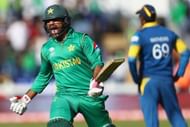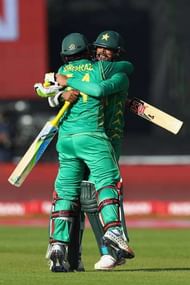Sarfraz Ahmed arrives at the crease against India with Pakistan four down and needing 175 more runs off 17 overs. He’s a good batsman, the most sprightly and aggressive of this Pakistani lot. He should ideally be opening. But he’s batting six, which is pretty strange, and doubly so because he’s the skipper.
He replaces Shoaib Malik, who has just been caught half a mile short of his crease by an all too familiar Ravindra Jadeja direct hit. Sarfraz hangs around for a bit, hits a couple of boundaries, sees Imad Wasim and Mohammed Hafeez being undone and follows suit.
There are days when Sarfraz looks as if he’s on a mission, like an army general who’ll bomb the entire civilisation if he has to in order to eliminate the enemy. But there are other days when he lacks focus, is unenthusiastic and generally lost. Today is one of these off days.
That Pakistan would lose was a foregone conclusion. And whether Sarfraz came out to bat or not wouldn’t have caused that fact to change.
Against India, on a rainy day at Birmingham, in the most awaited match of the group stages of the Champions Trophy, the Pakistani skipper went missing.
Not just him, his entire team.
Teams win the toss and bowl first almost always in modern day ODIs. That’s how their squads are structured. They back their batting, replete with a good balance of anchors, fluent stroke-makers and power hitters to chase down anything they’re set.
That’s the trend, that’s how modern sides go about their business. Against India, Pakistan attempted to do that too. Except their batting is anything but balanced and they are not a modern day ODI side. They haven’t been for quite a while now.
Pakistani ODI teams of yore had flair, they were charismatic. They had their own aura, their own swagger. Imran, Wasim, Waqar, Akhtar, Afridi, Saeed Anwar, Inzamam, Razzaq, Saqlain, Qadir were all modern players before the world, the cricketing world, embraced modernity, before they even knew what modern was.
The present day side is as different to the old one as jazz is to heavy metal. The only thing common is that they are teams that represent or represented Pakistan in ODI cricket, just like the only thing common between jazz and heavy metal is that they fall under the banner of music.
The Pakistan of today opens with Ahmed Shahzad and Azhar Ali. Shahzad is like the Pakistani Virat Kohli, or at least likes to think of himself as, with all that styled hair, groomed beard and the air of a superstar. That’s where the comparisons end, though. On the field, with the bat, Kohli averages 53 and strikes at 90. Shahzad averages 33 and strikes at barely 70. He’s a wreck off it, with regular disciplinary issues and is often dropped. He’s talented, but he hardly ever makes it count. Today is no different. He goes for a pretty 12 off 22 balls.
Azhar is a Test batsman. He shouldn’t be anywhere near an ODI team. That he was captain at the beginning of the year tells you where Pakistan stands. Anyway, he scores a sedate half-century today. This is why they keep him on the team. He is a terribly slow scorer but at least he scores runs more consistently than the others.
Babar Azam is a class apart, he stands out. The joint fastest ever to 1000 runs, in just 21 innings, he has five centuries in 26 matches and averages 54. He is a phenomenal player but four of his five centuries have come against the West Indies who couldn’t even qualify for the Champions Trophy and recently lost to Afghanistan. He needs to prove his mettle against better opposition and on foreign turf. He doesn’t do that today and is sent packing for 8.
Mohammed Hafeez is a reliable cricketer. Decent with the bat, bowls handy off-spin, is sharp in the field, and has a cool head. But at this stage in his career, that’s all he offers. Reliability, or at least a semblance of it. Same goes for Shoaib Malik. They’re not match-winners. Hafeez makes an invisible 33. Malik bowls two overs for ten and is run out for 15.
Sarfraz is spunky, erratic and the most like the old generation Pakistani cricketers. What he lacks, and lacks massively is consistency. He captains his team horribly today. He doesn’t attack even when India give him every opportunity to. He can’t even control the runs when he spreads out his fields.
He opens the bowling with the left arm spin of Imad Wasim who seems as baffled as us as to whether he has been brought on to check an aggressive start or to take wickets. His batting doesn’t matter today, the match was already lost by then. He scores 15 as well.
But, taking all things into consideration, it wasn’t a monumental failure by their batsmen. For they are very simply not good enough.
Performances like these aren’t an anomaly, rather as common as potholes on Indian roads. And it’s as if we’ve resigned to the fact that it will never change. It’s only fair to think so.
Pakistan didn’t lose this match with the bat. They lost it with the ball. Because it’s their bowling that almost always manages to push them across the line.
Only this time, it collapsed in a heap, on itself, rapidly.
Imad Wasim opened the bowling and was properly confounded as to what he was to do, take wickets or stem the runs. Not confused in the ‘whether I like this girl or not confused’ but whether ‘I like girls at all confused.’ In the end, he did neither.
Wonderboy Mohammed Amir had held the entire Indian team by the throat, shaken it violently and choke slammed it onto a floor full of nails and rocks in the Asia Cup last year. Kohli somehow came out of it alive and gifted him a bat. Amir was generous today. He didn’t lose the bout, but didn’t win either. India were fine with this draw, Pakistan badly hurt. It showed in the end result. Eight overs and one ball for 32 before his calf gave way.
Wahab Riaz is like a drunken genius you’ll find at your neighbourhood bar. When in action, he’ll either be mesmerizingly amazing or supremely embarrassing. In the 2011 World Cup semi-final, he took five wickets. Today, he leaks more runs than a car whose petrol pipe has burst does petrol, and goes for 87 from less than nine overs. He twists his ankle and heads back home after the game.
Hassan Ali is an extremely skilful and skiddy bowler. He has pace and moves the ball at will. A rare combination. He hasn’t faced the pressure of an ICC tournament or an India-Pakistan game yet and his bowling unravels. He goes for 70 from ten and also drops a sitter at long off.
18-year-old Shadab Khan bowls well, checks the runs, gets the set Shikhar Dhawan off a full toss and has Yuvraj Singh dropped. But he doesn’t create the magic Pakistan hoped he would. 1 for 52 from ten.
Their fielding is awful, as it always is. Their batting seems to be from another time and extremely unreliable. That’s a given.
Whatever matches they win, it’s their bowlers who get the job done for them. Today they have a collective seizure. They let India make 319 from 48 overs. The target breaks their batting even before you can read the numbers 1 and 9.
They lose by 124 runs.
Their exit looks imminent. South Africa will surely be beyond them.
Hassan Ali sports a rugged look. He’s not someone you would want to mess with on the streets. Aggression seems inbuilt in him, it’s not pretentious like the others. Three days after the India debacle, he bowls the ball of the tournament, possibly of the year to dismiss Wayne Parnell. From around the sticks, pacy, angled in and moving just enough to rattle his off stump, opening him up and leaving him flabbergasted.
It’s hard to describe in words the euphoria around that ball. Even the Ronaldo-like celebration. Everything about Hassan seems so natural, so effortless, it’s mind boggling.
Usually with Pakistan, there are small moments when you look at them, their players and you know which Pakistan have turned up to the ground that day. Against India, the mentally absent picture of Sarfraz summed up the story.
Against South Africa, it was this ball by Hassan that didn’t just suggest which Pakistan had turned up, it took a microphone and screamed its lungs out.
By this stage, South Africa had been reduced to 118 for 6. David Miller took them to 219, a total well below par on a good surface.
Sarfraz was pretty spunky with his fields, proactive in chatting with his bowlers. The fields were responsible for at least a couple of wickets. Amir and Junaid Khan were excellent at the death and Hassan got three wickets in the middle overs to go with Imad’s two.
If India was a collective seizure for them, then this was a successful CPR that saved a sinking campaign, at least for the time being.
The batting could be trusted to chase down 219, but they also had to contend with rain and the mathematics of Mr. Duckworth and Mr. Lewis, apart from an attack comprising Morne Morkel, Kagiso Rabada and Imran Tahir among others.
The inclusion of Fakhar Zaman surely helped. Here was a bloke who averaged 50, that’s right 50 in List A cricket and who scored runs at more than a fair clip. It was surprising that he hadn’t been given a chance before. More than surprising.
While Azhar went about his grandfatherly ways at one end, Fakhar got them off to a flier by Pakistani standards, 40 off seven overs of which 31 came off his own blade.
The famous Pakistani wobble did happen, and they were reduced to three for 93 after 23 overs. But rain intervened soon after and the maths favoured them.
Before anything disastrous could happen, the match was called off and they were declared winners through the DL method.
Their bowling had been top class today. Their batting managed to cling on for some time until luck played its part in helping them win.
Maybe if they had to chase the actual target, they would have fallen headfirst onto the ground while attempting to just maintain their balance. Maybe not. Although the first possibility seems more likely.
But it didn’t come to that.
And they won and they had another shot.
Mohammed Amir is a handy batsman. He’s sensible and has a good technique. He’s their number 9.
Ideally, in a chase of 237, he shouldn’t be batting. Even more so when the score is 74 without loss after 11 overs. But this was Pakistan. There had to be some drama.
The picture that defined the game against Sri Lanka was just after Amir had joined Sarfraz at the crease. Sarfraz was telling him something, pointing to the field and was generally animated. Amir was listening, and he was absorbing. He wasn’t trying to be a hero, trying to hit boundaries and sixes. Rather, he was blocking the ball, taking the odd single and leaving it alone when he could. He was being sensible, something tail enders are generally not. And he was calm, something Pakistani batsmen in an ODI chase are not.
He arrived at the crease when they were seven wickets down for 162. 75 runs were still needed.
How on Earth did it come to that?
Simply put, the Pakistani batsmen lost it. They froze under pressure, of the target, the bowling and the importance of the match. Azhar, Azam, Hafeez, Malik, Imad everyone except Fakhar, who made a 36 ball 50, and debutant Fahim Ashraf, who was batting pretty well on 15 before he was run out.
But Sarfraz was still there. Today, his eyes had that fire, that passion which seemed missing against India.
Today, his batting mattered. It mattered a hell of a lot to the people of a nation which doesn’t provide them many reasons to smile. It mattered to a team which qualified for this tournament by the skin of their teeth. It mattered to the cricket loving population of the world for the game needs a strong Pakistani team. Today, more than ever, Sarfraz Ahmed and his batting mattered.
And boy oh boy, did he handle it beautifully. Himself, Amir, the bowling, the expectations and the stage. Amir held his own for a magnificent, unbeaten 28 as well.
Sarfraz’s wasn’t a chanceless innings. He was dropped twice and nearly run out thrice. But none of that was important right now.
When Sarfraz uppercut Lasith Malinga for four, he ran with his arms aloft, letting out screams of joy all the while. Amir yelped too and then jumped on him.
Shadab, benched today, came running to them. So did Rumman Raees. Azhar hugged the life out of coach Mickey Arthur on the balcony. Imad celebrated like it was the best day of his life in the city of his birth. These players, underestimated, often belittled and almost always hard done by, had done it.
They were happy. So was their nation.
They needed it, this moment, desperately, needed it more than any other team did.
Sarfraz didn’t show up against India. He was physically there, mentally somewhere else. His team lacked direction, a leader.
Against Sri Lanka, he played one of the more important knocks in the recent history of Pakistani cricket. He held himself and the team together. He did this batting at six.
He should ideally be opening. His game is best suited to that. But he doesn’t and he won’t in the near future either. Because Pakistan do not have anyone to guide them through in the lower middle order.
They just have to make things work somehow. Even if that means batting their best player at six.
That Sarfraz does so willingly, playing an innings like the one he did, says a lot.
Pakistan are not like the other teams. They lack an all round balance. They lack professionalism. Luck has played a part in them reaching the semis, quite some part and they’ll probably be thumped by England.
But they’ll still give us something, a little something to look forward to the next time they play. For even when Pakistani cricket frustrates, it charms.
Somehow.
They are not a modern day side. Heck, they aren’t even a good ODI side. They try to play like them, winning tosses and bowling first despite knowing they’re terrible chasers. They are ranked eighth in the world. Bangladesh are now sixth.
They lose more often than they win.
But when they win, it’s a full-blown drama. It’s theatrical, maniacal, stupid, frustrating, heart racing, glorious and too bloody beautiful.
We crave this clichéd Pakistani madness, we need it in bulk and we need it now. It goes a long way in making cricket the beautiful sport it is. It genuinely does.
Follow IPL Auction 2025 Live Updates, News & Biddings at Sportskeeda. Get the fastest updates on Mega-Auction and cricket news



